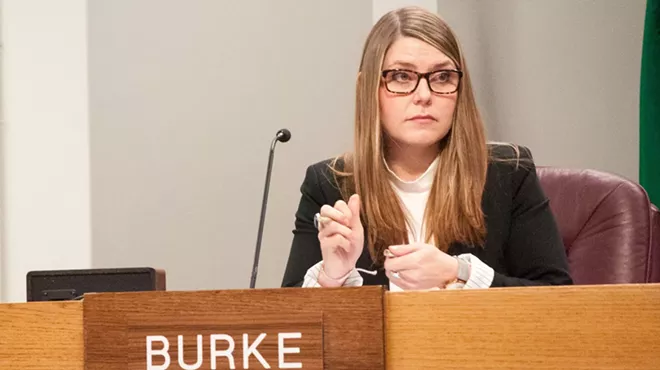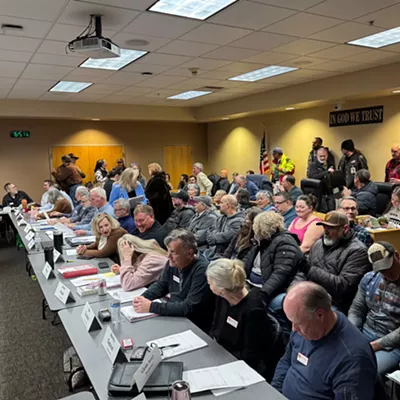Friday, February 9, 2018
Spokane leaders talk Time's Up, resources for sexual assault survivors

Start by believing people.
Over and over, a panel of experts who work with victims of sex crimes and sexual harassment told a crowd gathered at the Northeast Community Center that the first and best thing the community can do to help victims of sex crimes and sexual harassment is to start by believing people who say they've been hurt.
Among those who spoke were sexual assault victim advocates, survivors, a judge, the sheriff, special victims detectives and prosecutors, medical and legal professionals, and others whose work touches on the topic.
"I think we have done a really poor job as a society of how we react when we first hear a report of sexual assault," says Sgt. Mike McNab, supervisor of Spokane Police Department's Special Victims Unit. "We always react with doubt, skepticism, and I think this reaction has come from the stereotype that’s false, that I refer to as the 'real rape.'"
That's the stereotype where a "boogie man" jumps out of the bushes, attacks a victim, who fights back with everything she has, then the police swoop in and save the day, McNab says.
Except in very rare instances, that's just not the type of case that comes into his unit. But as cases go through the court process, they're still held to that false standard, he says.
"I’ll believe you. My detectives will believe you. The prosecutor’s gonna believe you," McNab says. "But can the prosecutor get 12 people in a jury box to believe you? Because they’re also going to have this stereotype."
Others on the panel spoke to the limitations of the judicial and criminal investigation systems.
Judge Annette Plese says she always wants to hear from victims during cases and that can be a powerful moment for victims when they get to tell their story to a judge. But one difficult part of criminal cases is that what she can sentence someone to is limited to a predetermined range, set by the state legislature for each crime.
"It's really hard for me as a judge to sit up there and say this is what the range is: one to two months, three to four months," Plese says. "When someone has been victimized it's really hard to hear."
From the Washington State Patrol crime lab in Cheney, scientist Lorraine Heath shared that since 2015, the agency has been working toward testing a backlog of thousands of rape kits that have been submitted to law enforcement but, for one reason or another, have not been analyzed and entered into a nationwide database.
Entering the information can match the DNA in the kits with DNA profiles of people who've been convicted of felonies, helping solve long-unsolved cases, and in other instances, investigators are finding multiple rapes connected to individual perpetrators.
But it's taking time to make it through the backlog, partly because they had to hire and train technicians, and because the testing itself takes time.
"Sadly it's not CSI either, so the cases don't take 45 minutes with commercials," Heath says.
Washington received a $3 million grant from the Department of Justice last fall to help pay for the tests, which can run about $700 for each kit. Half of that grant will help inventory the backlog that exists, Heath says.
"It's a massive undertaking, because we are also processing the current cases being submitted as well as those older cases," Heath says. "In terms of what the community can do to support our part of it is if you are a victim of sexual violence or your friend or family member is, preservation of the evidence is what you need to help the process. That means getting a kit done as soon as possible."
MEN NEED TO STAND UP
Phil Tyler, former president of the NAACP and a community advocate who sits on the Spokane County Human Rights Task Force, said he wishes more men were in the room for the forum Thursday night, because more men need to stand behind survivors.
After hearing of sexual harassment against female friends and against his wife, Tyler says he felt helpless at first, but then decided to gather men who are leaders in the community to create a video promising they would hold the city and county accountable.
We Will Rise from Phillip Tyler on Vimeo.
"We need that accountability," Tyler says to the crowd. "We as men, and I’m sorry gentlemen, we can no longer be comfortable, complacent or complicit in the locker room conversations that ultimately lead to the behaviors that result in sexual harassment or sexual abuse."But even after working on the video and trying to make sure men are accountable, Tyler says he's sadly hearing some of his male friends say they "can no longer work with, work around, or even compliment women."
"Notice I didn’t say they said 'work for.' And what I said to them is, that’s nonsense. That’s simply a pivot," Tyler says. "You can still compliment your female coworkers, your friends. Compliment them on their knowledge. Compliment them on what they bring to the team. Compliment them on their contributions to our society. Compliment them on their body of work, not on their bodies."
COMMUNITY QUESTIONS
Questions from the audience ranged from general to very personal, with several people opening up to share pieces of their own experiences.
One woman asked whether Spokane is a warehouse for sex offenders, which Sheriff Ozzie Knezovich said is not quite the case.
"I wouldn't say that we're a warehouse, it's just that we are a major population center, and those individuals tend to come to a larger population center because it's easier to blend in," Knezovich said.
However, with efforts to move people off of McNeil Island, where the state holds sexual predators who are deemed most likely to reoffend, Knezovich says that Spokane is starting to see more violent predators move to the area, and law enforcement agencies here are not readily equipped to handle that yet.
Another woman said she walks by a building every day that houses dozens of registered sex offenders, and she wanted to know why that was allowed.
Spokane City Council member Kate Burke said that she understood concerns of neighbors and actually had plans to tour the building soon, but that there needs to be a balance of empathy in understanding that it is safer for offenders to be housed and that some studies have shown they are less likely to reoffend when living in group settings because they hold each other accountable.
"The more restrictions we put on, the more likely they're going to be on the streets, which is where they are going to reoffend," Burke said.
A nurse who herself is a survivor of sexual assault asked whether the community would start a Sexual Assault Response Team.
"Why do we not have a team that's specific to this? I understand there's budgets, but our budgets show our priorities," she said. "We need to make sure that these rape kits are appropriately done. That victims aren't being further traumatized by the process of getting these kits done."
Specifically, she wanted to know if the community would ensure there are sexual assault nurse examiners who have extra training in collecting those kits and in helping victims of trauma.
Robbie Thorn, manager of the Providence Holy Family Emergency Department, said that Providence is working on getting more training to their nurses, and that their department had now set aside a private room for when those cases come in, but that more work was needed.
Spokane County Deputy Prosecuting Attorney Kelly Fitzgerald said that she would be helping train nurses this spring in how to be successful witnesses in court, but that resources for more training were needed.
"We have got to put resources into this area," Fitzgerald said. "If we do not continue to back up listening with resources we are not going to do anything to that will barely make a dent in the problem."
Among the commenters were Cindy and Chuck Esch, who cofounded Childhood Saved, a nonprofit to help survivors of childhood sexual abuse pay for the costs of therapy. Specifically, they can help cover co-pays for those who have insurance but just can't swing the cost, or those who don't qualify for other assistance available to people who make less money.
Both Cindy and Chuck were abused as children and neither of them told each other until after they were married and it bubbled to the surface for them.
"I am here to tell you I know it is difficult," Cindy Esch said. "I promise you it does not have to define you. If you are stuck, if you are stopped, if you are suffering, do not quit. Do not give up. Keep asking for help. We are here for you and we will help you until you are whole and healed."
RESOURCES
Lutheran Community Services' 24-hour sexual assault crisis line is 509-624-7273.
You can also call Frontier Behavioral Health's 24-hour First Call for Help line, which is available for supportive listening and helping with all sorts of emotional and mental health issues, at 509-838-4428 or toll free at 1-877-678-4428.
Tags: news , times up , town hall , spokane , sheriff , ozzie , phil tyler , sexual assault , harassment , metoo , hospital , rape kit , Image




















